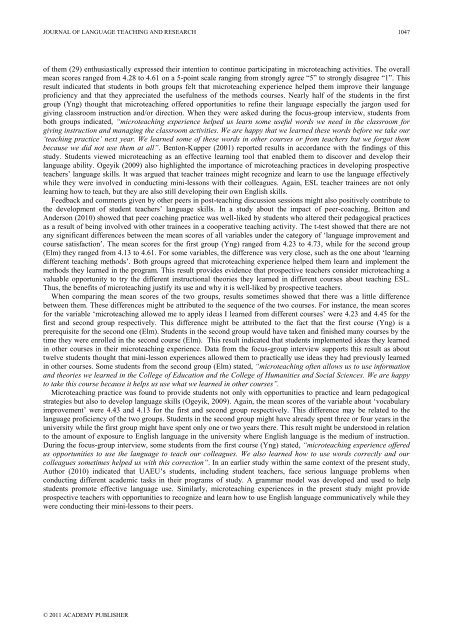Journal of Language Teaching and Research Contents - Academy ...
Journal of Language Teaching and Research Contents - Academy ...
Journal of Language Teaching and Research Contents - Academy ...
Create successful ePaper yourself
Turn your PDF publications into a flip-book with our unique Google optimized e-Paper software.
JOURNAL OF LANGUAGE TEACHING AND RESEARCH<br />
<strong>of</strong> them (29) enthusiastically expressed their intention to continue participating in microteaching activities. The overall<br />
mean scores ranged from 4.28 to 4.61 on a 5-point scale ranging from strongly agree “5” to strongly disagree “1”. This<br />
result indicated that students in both groups felt that microteaching experience helped them improve their language<br />
pr<strong>of</strong>iciency <strong>and</strong> that they appreciated the usefulness <strong>of</strong> the methods courses. Nearly half <strong>of</strong> the students in the first<br />
group (Yng) thought that microteaching <strong>of</strong>fered opportunities to refine their language especially the jargon used for<br />
giving classroom instruction <strong>and</strong>/or direction. When they were asked during the focus-group interview, students from<br />
both groups indicated, “microteaching experience helped us learn some useful words we need in the classroom for<br />
giving instruction <strong>and</strong> managing the classroom activities. We are happy that we learned these words before we take our<br />
„teaching practice‟ next year. We learned some <strong>of</strong> these words in other courses or from teachers but we forgot them<br />
because we did not use them at all”. Benton-Kupper (2001) reported results in accordance with the findings <strong>of</strong> this<br />
study. Students viewed microteaching as an effective learning tool that enabled them to discover <strong>and</strong> develop their<br />
language ability. Ogeyik (2009) also highlighted the importance <strong>of</strong> microteaching practices in developing prospective<br />
teachers‟ language skills. It was argued that teacher trainees might recognize <strong>and</strong> learn to use the language effectively<br />
while they were involved in conducting mini-lessons with their colleagues. Again, ESL teacher trainees are not only<br />
learning how to teach, but they are also still developing their own English skills.<br />
Feedback <strong>and</strong> comments given by other peers in post-teaching discussion sessions might also positively contribute to<br />
the development <strong>of</strong> student teachers‟ language skills. In a study about the impact <strong>of</strong> peer-coaching, Britton <strong>and</strong><br />
Anderson (2010) showed that peer coaching practice was well-liked by students who altered their pedagogical practices<br />
as a result <strong>of</strong> being involved with other trainees in a cooperative teaching activity. The t-test showed that there are not<br />
any significant differences between the mean scores <strong>of</strong> all variables under the category <strong>of</strong> „language improvement <strong>and</strong><br />
course satisfaction‟. The mean scores for the first group (Yng) ranged from 4.23 to 4.73, while for the second group<br />
(Elm) they ranged from 4.13 to 4.61. For some variables, the difference was very close, such as the one about „learning<br />
different teaching methods‟. Both groups agreed that microteaching experience helped them learn <strong>and</strong> implement the<br />
methods they learned in the program. This result provides evidence that prospective teachers consider microteaching a<br />
valuable opportunity to try the different instructional theories they learned in different courses about teaching ESL.<br />
Thus, the benefits <strong>of</strong> microteaching justify its use <strong>and</strong> why it is well-liked by prospective teachers.<br />
When comparing the mean scores <strong>of</strong> the two groups, results sometimes showed that there was a little difference<br />
between them. These differences might be attributed to the sequence <strong>of</strong> the two courses. For instance, the mean scores<br />
for the variable „microteaching allowed me to apply ideas I learned from different courses‟ were 4.23 <strong>and</strong> 4.45 for the<br />
first <strong>and</strong> second group respectively. This difference might be attributed to the fact that the first course (Yng) is a<br />
prerequisite for the second one (Elm). Students in the second group would have taken <strong>and</strong> finished many courses by the<br />
time they were enrolled in the second course (Elm). This result indicated that students implemented ideas they learned<br />
in other courses in their microteaching experience. Data from the focus-group interview supports this result as about<br />
twelve students thought that mini-lesson experiences allowed them to practically use ideas they had previously learned<br />
in other courses. Some students from the second group (Elm) stated, “microteaching <strong>of</strong>ten allows us to use information<br />
<strong>and</strong> theories we learned in the College <strong>of</strong> Education <strong>and</strong> the College <strong>of</strong> Humanities <strong>and</strong> Social Sciences. We are happy<br />
to take this course because it helps us use what we learned in other courses”.<br />
Microteaching practice was found to provide students not only with opportunities to practice <strong>and</strong> learn pedagogical<br />
strategies but also to develop language skills (Ogeyik, 2009). Again, the mean scores <strong>of</strong> the variable about „vocabulary<br />
improvement‟ were 4.43 <strong>and</strong> 4.13 for the first <strong>and</strong> second group respectively. This difference may be related to the<br />
language pr<strong>of</strong>iciency <strong>of</strong> the two groups. Students in the second group might have already spent three or four years in the<br />
university while the first group might have spent only one or two years there. This result might be understood in relation<br />
to the amount <strong>of</strong> exposure to English language in the university where English language is the medium <strong>of</strong> instruction.<br />
During the focus-group interview, some students from the first course (Yng) stated, “microteaching experience <strong>of</strong>fered<br />
us opportunities to use the language to teach our colleagues. We also learned how to use words correctly <strong>and</strong> our<br />
colleagues sometimes helped us with this correction”. In an earlier study within the same context <strong>of</strong> the present study,<br />
Author (2010) indicated that UAEU‟s students, including student teachers, face serious language problems when<br />
conducting different academic tasks in their programs <strong>of</strong> study. A grammar model was developed <strong>and</strong> used to help<br />
students promote effective language use. Similarly, microteaching experiences in the present study might provide<br />
prospective teachers with opportunities to recognize <strong>and</strong> learn how to use English language communicatively while they<br />
were conducting their mini-lessons to their peers.<br />
© 2011 ACADEMY PUBLISHER<br />
1047

















